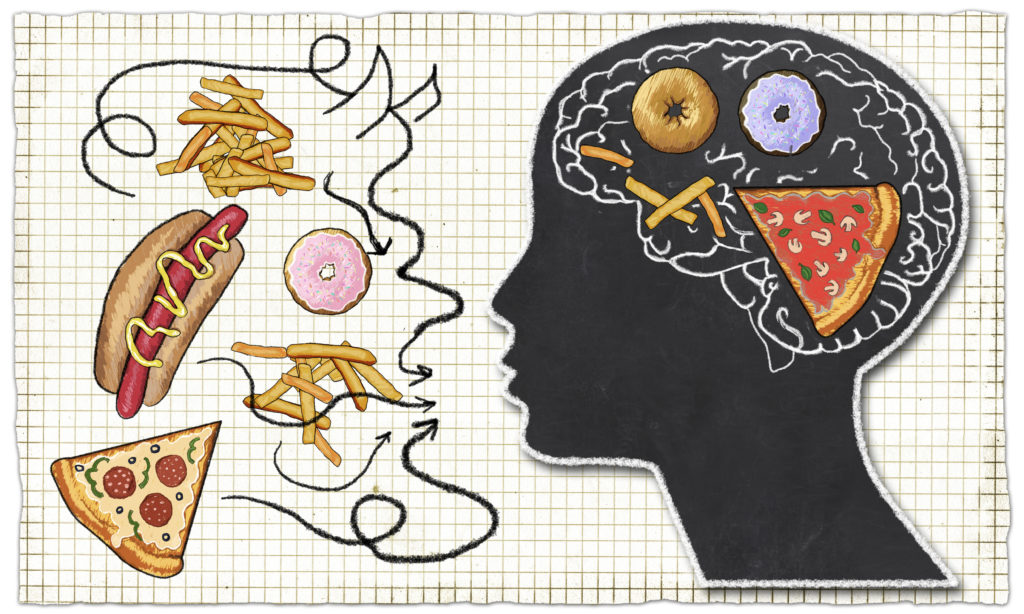Quick Hits
Daily brief research updates from the cognitive sciences

Is weight loss all in the mind?
Well, with the danger of oversimplifying a complex topic, this latest research shows it is, and shows precisely how and with what networks. So, what did these researchers find?
The goal of this study was to measure the effectiveness of a behaviour-based (a good old-fashioned diet with restriction of calories) weight loss intervention. This was carried out by Jonathon Burdette and his team – they had previously identified two networks that are related to weight loss. These, called Functional Network 1 and 2 in this study (FN1 or FN2) with FN1 a network related to sensory and motor control and FN2 related to attention and cognitive control.
Participants were scanned in resting state (while doing nothing) and then after completing a food-cue task. They then completed a 6-month programme for weight loss and their results measured and then compared to their brain scans. What did they find?
They found that those who failed to lose weight had higher activity in FN1 in the resting state and lower activity in FN2 after the food-cue task. This may not sound clear but what it actualyl suggetss is those who had trouble losing weight had a higher natural desire to search out and find food in a resting state combined with inhibited or lower emotional regulation, control, and focus in the presence of food.
This therefore suggests that even in resting state the brain is activated differently and rather than a question of simple will power, it is different neural activation patterns – which may be less of a problem “in the wild” but in modern society when there are food cues everywhere, this can be obviously problematic.
The researchers don’t give any tips at this stage, but it is a step forward in understanding some of the challenges and dynamics of weight loss and getting obese in the first place. It also shows that a more individualised approach is necessary because individuals face different challenges.

Andy Habermacher
Andy is author of leading brains Review, Neuroleadership, and multiple other books. He has been intensively involved in writing and research into neuroleadership and is considered one of Europe’s leading experts. He is also a well-known public speaker speaking on the brain and human behaviour.
Andy is also a masters athlete (middle distance running) and competes regularly at international competitions (and holds a few national records in his age category).
Reference
Jonathan H. Burdette, Mohsen Bahrami, Paul J. Laurienti, Sean L. Simpson, Barbara J. Nicklas, Jason Fanning, W. Jack Rejeski.
Longitudinal relationship of baseline functional brain networks with intentional weight loss in older adults.
Obesity, 2022; 30 (4): 902
DOI: 10.1002/oby.23396
More Quick Hits
Don’t Try to Change Minds – Change Behaviour
Don’t try to change minds, but simply change behaviour is the result a group of researchers have come to with regard to vaccinations.
Why Heat Makes Us Sleepy
Imagine if you are working and your stress levels are increasing, and then automatically soothing music is turned on to calm you down. Or alternatively if you are heading towards that after lunch dip of drowsiness and upbeat energetic music is turned on to energise you.
Tracking Mental States Through Your Skin – In Real Time
Imagine if you are working and your stress levels are increasing, and then automatically soothing music is turned on to calm you down. Or alternatively if you are heading towards that after lunch dip of drowsiness and upbeat energetic music is turned on to energise you.
Testosterone Promotes Cuddling
Quick HitsDaily brief research updates from the cognitive sciences es, you read the headline correctly. Testosterone considered the ultimate male hormone and often associated with aggression has had a bad rap. So, is all of this wrong? Well, the...
Online Learning Triggers Different Stress Responses
Quick HitsDaily brief research updates from the cognitive sciences ot so long ago all learning went online – out of necessity. There has been plenty pf research into differences in online learning and in-person learning but this study by Gellisch...
Use It Or Lose It – Mental Activity Reduces Dementia
Quick HitsDaily brief research updates from the cognitive sciences regularly write on which activities reduce risks of cognitive decline (just last week I reported on how your job can protect your mental abilites with age and also doing household...






